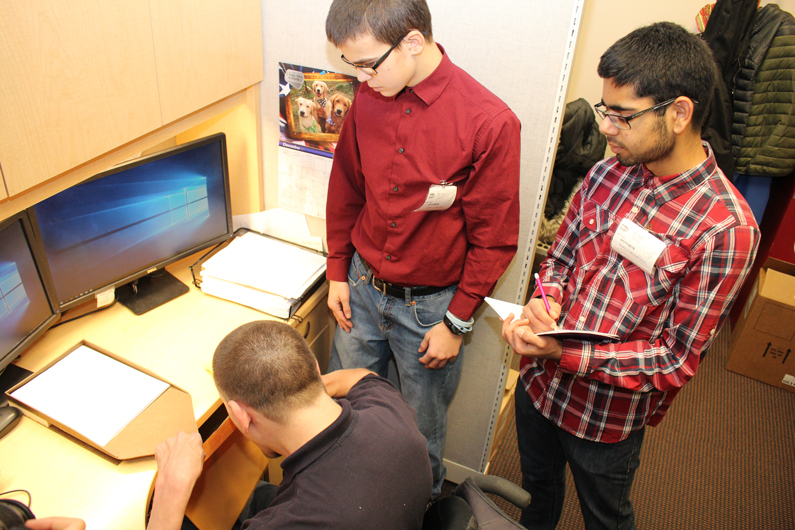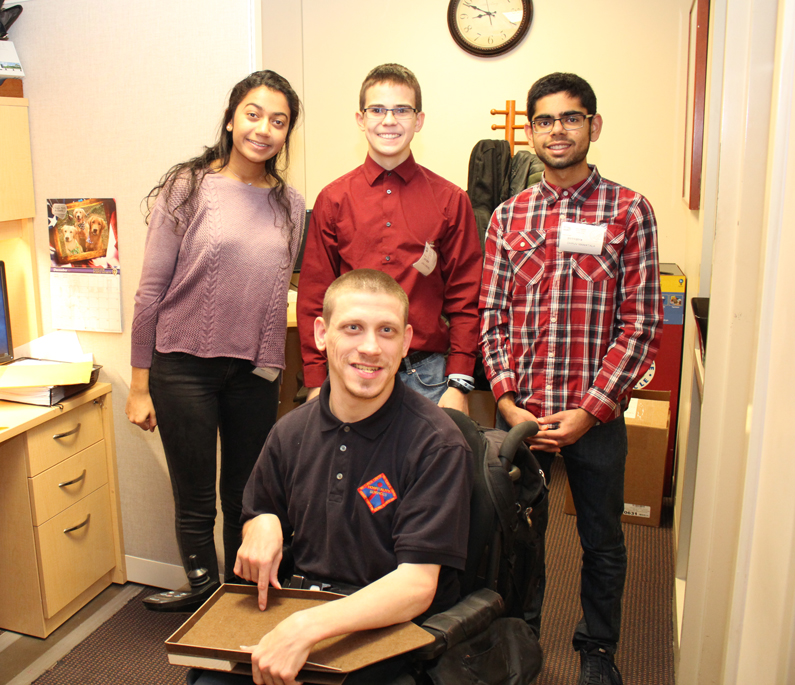Content on this webpage is provided for historical information about the NIH Clinical Center. Content is not updated after the listed publication date and may include information about programs or activities that have since been discontinued.

Ricky Day uses the prototype device designed for him by the three students from Poolesville High School.
Thanks to the bright minds of three local high school students, NIH Clinical Center employee Ricky Day has been able to use a new device that has helped him more than double his productivity in the Office of Administrative Management.
Day, who graduated from NIH Project SEARCH in 2011, is in charge of processing patient taxi voucher receipts and invoices. By entering the receipt amounts into an Excel spreadsheet, he is able to compare the charged amount to the travel time – checking for possible discrepancies or overcharges. As part of this, Day has to take documents in and out of a manila envelope. The task of placing the large stack of papers back into the envelope is especially challenging due to his limited dexterity.
"After being introduced to Ricky, we were inspired by his positive attitude and determination to complete his tasks independently, regardless of how difficult they may be," said Alex Carbonell. He, along with his classmates Dhruv Maniktala and Ashwini Thirukkonda, are involved in the Science, Mathematics, and Computer Science program at Poolesville High School. As a part of the program, they were required to find an opportunity to apply their knowledge from the course in the community.
"Despite our limited experience in the engineering field, we wanted to help Ricky become more confident, independent and productive. With this in mind, we set out to build an assistive technology for him," Maniktala said.
To solve the problem, the students designed a specialized tray that could hold and align the documents. After placing them in the tray, Day can slide an envelope onto the device, surrounding the paper. Finally, using the handles, Day can tilt the device to allow the paper to slip into the envelope.
Traveling back and forth from school to the NIH over several months, the students brought updated prototypes and tweaked it according to feedback from Day.
"As we've worked with Ricky, we've seen just how hardworking and optimistic he is. Ricky's also a problem-solver in his own right, and his ideas and suggestions have driven our design process," Thirukkonda said. "It's also been amazing to see just how much our simple, and inexpensive device has more than doubled his productivity, which will impact the Clinical Center and its patients. Still, the best thing would have to be seeing Ricky's face light up after he's used a new prototype [of the device], and knowing that our work made that happen."
In April 2018, the students won the SourceAmerica Design Challenge for the device they created for Ricky Day. The challenge is a nationwide engineering competition in which groups of students partner with local nonprofit organizations that employ people with disabilities to develop an assistive technology that will help an employee become more efficient and independent.
While the students did win a monetary prize, they said the biggest takeaway was being able to apply the engineering principles learned in class to a real world situation in order to develop a better understanding of the problems people face in the workplace and how they can solve them.
View the video of the project online.

Ricky Day, front, holds the prototype device designed for him by the three students from Poolesville High School.

